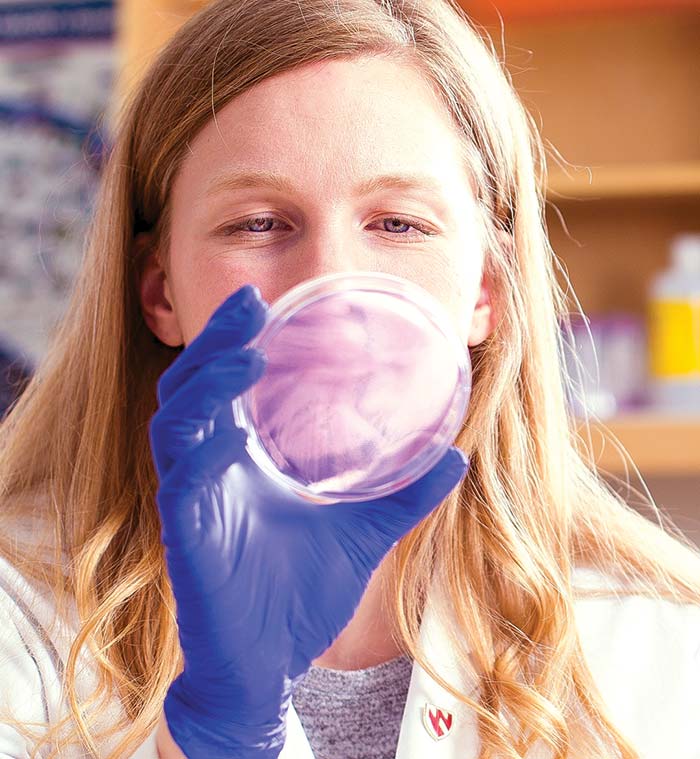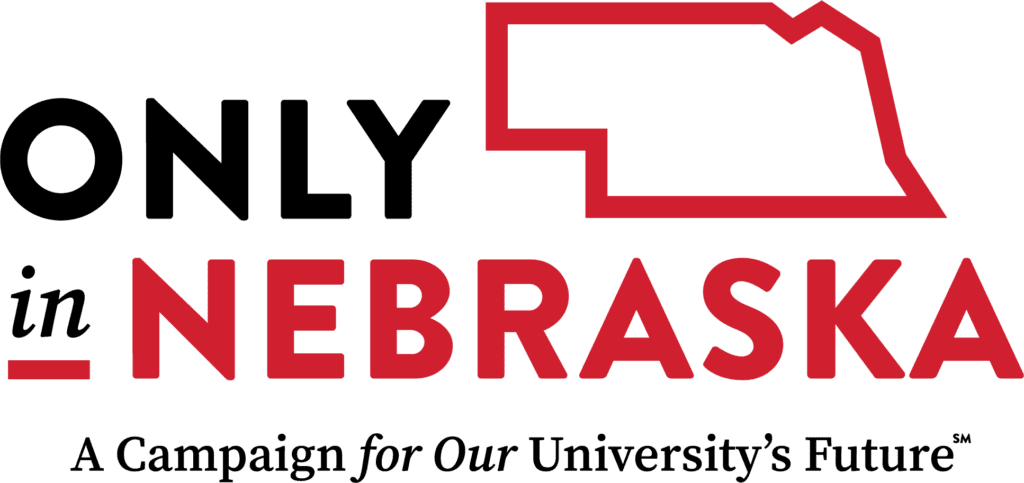She’s a killer


Young UNMC researcher looking for ways to target cancer cells.
In her dreams, she’s a killer.
One who looks for weaknesses in her targets, so she can take them out.
Cancer cells.
“I definitely dream about cancer cells,” says Beth Clymer, a medical student and cancer researcher at the University of Nebraska Medical Center.
She laughs.
“I think when you spend, you know, 10 hours a day doing anything, you’re going to start to dream about it,” she says. “And I’ve definitely had some interesting dreams.”
Many therapies being used today kill cancer cells but have dramatic side effects on the patient, so the lab she’s part of at UNMC is looking for ways to specifically target and kill the cancer cells without affecting normal cells, she says.
Her research focuses on ways to kill cancer cells through a protein called Timeless, which is regulated by the normal 24-hour circadian rhythm of a human body. Cancer cells disrupt the circadian rhythm, she says. Normal cells don’t.
Beth works in the Lewis Lab (under Robert Lewis, Ph.D.) on the ninth floor of the Suzanne and Walter Scott Cancer Research Tower of the new Fred & Pamela Buffett Cancer Center, which was officially dedicated in May.
The cancer center itself is a dream come true, Beth says.
For students. For researchers.
And especially for cancer patients.
“It’s a beautiful building,” she says. “We’re very excited to have all of the cancer researchers in one place and not spread across campus. We’re going to be able to collaborate even better and more directly than we have in the past.”
And cancer researchers are now able to see, in the flesh, the real people whose lives and healthy cells they’re working to save.
“It’s powerful for us researchers to see patients every day,” Beth says. “It’s very easy to get into the grind of doing the same thing, over and over again, and, you know, your experiments aren’t working and it’s really not going well this week — and then you see a patient, and they can really help you to focus and to stay motivated.
“Having that interaction definitely will lead us to trying to do as much as we can every single day, even when we’re having bad days when our experiments aren’t working,” she says.
The Fred & Pamela Buffett Cancer Center features:
the eight-level C.L. Werner Cancer Hospital, which includes a multidisciplinary outpatient area and a 108-bed inpatient hospital;
the 10-story, 98-laboratory Suzanne and Walter Scott Cancer Research Tower;
cornerstones of the campuswide Healing Arts Program: the Chihuly Sanctuary, given by Suzanne and Walter Scott; Leslie’s Healing Garden, given by Mona and Marshall Faith; and Search, a lighted tower.
The cancer center was named in recognition of a gift made by Omaha native and University of Nebraska graduate Pamela Buffett, whose husband, Fred, died in 1997 from kidney cancer.
Almost everyone, Beth says, has been hit by cancer in some way. Her own grandma was diagnosed with Stage 4 colon cancer a few years ago and eventually passed away.
Education, Beth says, is important for cancer patients. It was for her grandmother.
“I know it was comforting for her to have me around after she was diagnosed with cancer because I was able to answer a lot of her questions, and I was able to help her understand what was happening.
“I think sometimes that’s a big struggle for a lot of patients because they know they have cancer, but they don’t necessarily really understand what that means or understand all of the therapies that they’re taking.”
A beautiful thing about the new cancer center, Beth says, is that it goes beyond healing the body. It also is designed to heal the spirit. That’s why one of her favorite parts is the integration of the campus’ Healing Arts Program into the Fred & Pamela Buffett Cancer Center. It includes therapeutic programs; an art collection; a respite place for patients, families and staff members called the Chihuly Sanctuary; and a large outdoor space called Leslie’s Healing Garden that’s filled with perennials and peace. It also features an 82-foot glass tower near the center’s entrance that serves as a guiding light for patients.
The cancer center, she says, also gives students who are pursuing a Ph.D. in cancer research a better look at what clinical experiences look like. Because she’s an M.D.-Ph.D. student, she says, she’s been able to work with both clinicians and researchers. But students pursuing the typical Ph.D. curriculum don’t often get that interaction.
And the new cancer center’s world-class facilities, she says, will help recruit even more world-class researchers, and that will be exciting to see.
Beth grew up in a small town in northeast Kansas. She studied computer science as an undergraduate in the University of Nebraska-Lincoln’s prestigious Jeffrey S. Raikes School of Computer Science & Management. She thought she’d go the traditional M.D. route at UNMC. But during her first year of medical school, she realized she missed the problem-solving aspect of computer science, so she switched to the M.D.-Ph.D. program. Now she combines her computational biology and analytical skills with her medical education — a good fit, she says, for studying cancer cells.
The main cells she studies are colon cancer cells.
“Sometimes I’ll go to sleep thinking about a problem or having just read a paper, and then I’ll wake up the next morning and it dawns on me that there’s some connection that I missed or some new hypothesis I want to test.
“And to me, that’s one of the most fun things to do.”
Of course, she says, her ultimate dream — the dream of any cancer researcher — is to find a cure. But cancer is many diseases, not just one. Many cures will probably be needed. She’s sure of this, though:
The new Fred & Pamela Buffett Cancer Center will be a place where many breakthroughs take place.
“It’s a game-changer for us in Nebraska as far as cancer research is concerned and also for every student that goes through that building, both now and in the future,” she says.
“It’s truly a great gift.”
The need for quality health care in our state is constantly growing. At UNMC, we’ve begun a new era of engagement, in which all alumni are welcomed to reconnect with us and help our students succeed. Whether you are a longtime supporter or a new graduate, you can impact students immediately through the UNMC Fund.
Every dollar you invest in the UNMC Innovation Funds provides opportunities to students, supports the people and programs of your Alumni Association, upgrades technology, funds White Coat and professionalism ceremonies, enhances innovative programs and more.
If you would like to assist today’s students bring cutting-edge health care to Nebraska and beyond, please make your gift to the UNMC Innovation Funds today.





